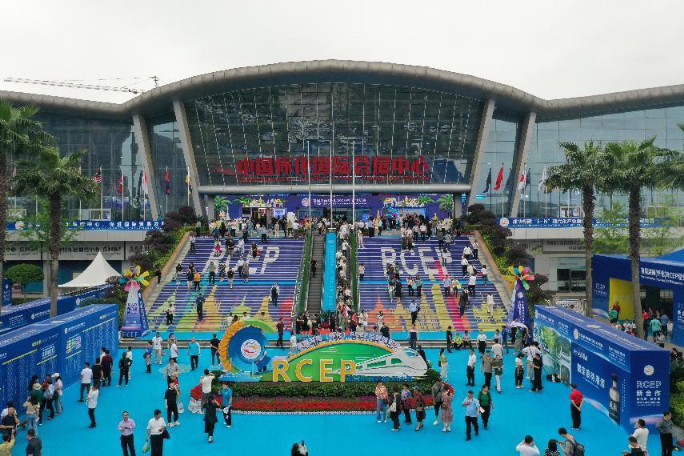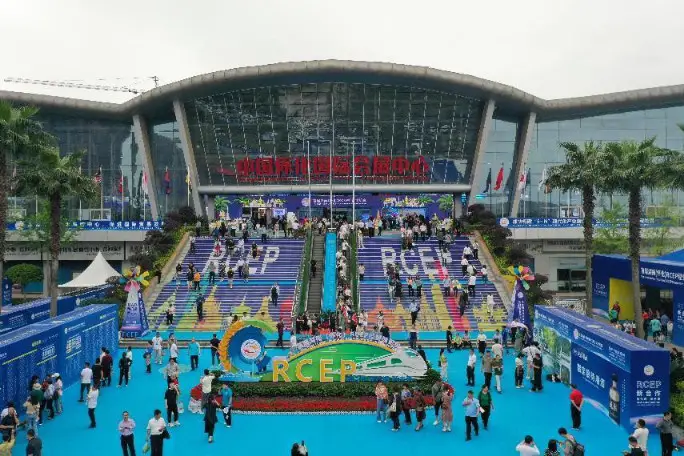By Luo Shanshan, People's Daily

Photo taken on May 5 shows the first Hunan (Huaihua) RCEP Economic and Trade Expo held in central China's Hunan province. (Photo by Tian Min/People's Daily Online)
The Regional Comprehensive Economic Partnership (RCEP) entered into force for the Philippines on June 2, confirming that the trade pact is now in effect for all 15 members.
The landmark RCEP agreement covers roughly 30 percent of the world's population, GDP and trade in goods, and the full implementation of the RCEP is a new stage for the trade bloc with the world's largest population and trade volume as well as the greatest development potential, said an official with China's Ministry of Commerce.
The full entry into force of RCEP reflects the determination and actions of its 15 members to support an open, free, fair, inclusive and rules-based multilateral trading system, continuously promoting a comprehensive, mutually beneficial and high-level economic partnership.
The 15 members' commitment to open goods, services and investment markets, superimposed with high-level rules in various fields, are expected to significantly promote the free flow of production factors in the region, including raw materials, products, technologies, talents, capital, information and data.
It will gradually form a more prosperous large regional market that promotes wider integration, higher-level and deeper open cooperation among member states, it added.
On June 2, Chenfeng Group, a company that manufactures and exports apparel products based in east China's Jiangsu province, received an RCEP certificate of origin for exports to the Philippines under RCEP from the customs. With this certificate, men's shirts manufactured by the company will enjoy zero-tariff treatment in the Philippines.
"After the RCEP agreement came into force in the Philippines, we have another choice following the China-ASEAN Free Trade Agreement. It is good news for us to expand exports and maintain overseas clients," said Yin Lijun, customs affairs manager of the company.
Since the RCEP was implemented, trade in goods between member countries has come more frequent, and regional trade has grown into a key factor stabilizing and driving their foreign trade growth, said an official with the Ministry of Commerce.
According to the official, thanks to the positive signals released by the implementation, the RCEP region continues to be a hot spot for global investment, with a growing trend in the utilization of foreign capital in most of the RCEP members. The RCEP region is attracting more greenfield investment as a whole.
The implementation of the trade pact plays a crucial role in stabilizing China's foreign trade and investment.
In the first four months this year, the total import and export volume between China and other RCEP members hit 4.12 trillion yuan ($577.91 billion) with a year-on-year increase of 7.3 percent, accounting for 30.9 percent of China's total foreign trade.
During the same period, China's actual use of investment from other RCEP members amounted to nearly $8.9 billion, a year-on-year growth of more than 13.7 percent.
Regions across China have strengthened policy coordination and optimized the business environment to enhance cooperation under the framework of the RCEP since the trade pact came into effect.
Many places have implemented trade facilitation measures provided by the RCEP agreement to a high standard, enabling 6-hour customs clearance for perishable and express products. They also built smart online RCEP public service platforms and promoted whole-process digital services related to RCEP certificates of origin to ensure that enterprises enjoy the benefits of the RCEP efficiently.
Some places in China launched or increased the number of foreign trade vessels, flights, and trains to other RCEP members, to improve logistics and supply chain services and lift the efficiency and capacity of customs clearance.
Local authorities and enterprises across China are utilizing RCEP's cumulative rules of origin and favorable policies for trade in service and investment market, to optimize regional trade and investment layout and promote the deep integration of industrial and supply chains.
Some places have combined RCEP policies with other open platforms such as pilot free trade zones to attract targeted investment in key industries, promoting the implementation of a series of major projects.
The RCEP is an opportunity for China to build a world-class business environment. Regions across China strictly obey domestic laws and regulations corresponding to RCEP mandatory obligations and implement RCEP encouraging obligations. Working to improve governance capability and attract industries, capital and human resources, they have significantly bettered the local trade and investment environment.
China will keep implementing the RCEP with high quality, said the Ministry of Commerce. Besides, it will work with other parties to fulfill obligations and strengthen the construction of the RCEP mechanism for better implementation of the agreement. It will contribute to the long-term stability of the cooperation under the RCEP and strive for win-win results and common development on a higher level.
The landmark RCEP agreement covers roughly 30 percent of the world's population, GDP and trade in goods, and the full implementation of the RCEP is a new stage for the trade bloc with the world's largest population and trade volume as well as the greatest development potential, said an official with China's Ministry of Commerce.
The full entry into force of RCEP reflects the determination and actions of its 15 members to support an open, free, fair, inclusive and rules-based multilateral trading system, continuously promoting a comprehensive, mutually beneficial and high-level economic partnership.
The 15 members' commitment to open goods, services and investment markets, superimposed with high-level rules in various fields, are expected to significantly promote the free flow of production factors in the region, including raw materials, products, technologies, talents, capital, information and data.
It will gradually form a more prosperous large regional market that promotes wider integration, higher-level and deeper open cooperation among member states, it added.
On June 2, Chenfeng Group, a company that manufactures and exports apparel products based in east China's Jiangsu province, received an RCEP certificate of origin for exports to the Philippines under RCEP from the customs. With this certificate, men's shirts manufactured by the company will enjoy zero-tariff treatment in the Philippines.
"After the RCEP agreement came into force in the Philippines, we have another choice following the China-ASEAN Free Trade Agreement. It is good news for us to expand exports and maintain overseas clients," said Yin Lijun, customs affairs manager of the company.
Since the RCEP was implemented, trade in goods between member countries has come more frequent, and regional trade has grown into a key factor stabilizing and driving their foreign trade growth, said an official with the Ministry of Commerce.
According to the official, thanks to the positive signals released by the implementation, the RCEP region continues to be a hot spot for global investment, with a growing trend in the utilization of foreign capital in most of the RCEP members. The RCEP region is attracting more greenfield investment as a whole.
The implementation of the trade pact plays a crucial role in stabilizing China's foreign trade and investment.
In the first four months this year, the total import and export volume between China and other RCEP members hit 4.12 trillion yuan ($577.91 billion) with a year-on-year increase of 7.3 percent, accounting for 30.9 percent of China's total foreign trade.
During the same period, China's actual use of investment from other RCEP members amounted to nearly $8.9 billion, a year-on-year growth of more than 13.7 percent.
Regions across China have strengthened policy coordination and optimized the business environment to enhance cooperation under the framework of the RCEP since the trade pact came into effect.
Many places have implemented trade facilitation measures provided by the RCEP agreement to a high standard, enabling 6-hour customs clearance for perishable and express products. They also built smart online RCEP public service platforms and promoted whole-process digital services related to RCEP certificates of origin to ensure that enterprises enjoy the benefits of the RCEP efficiently.
Some places in China launched or increased the number of foreign trade vessels, flights, and trains to other RCEP members, to improve logistics and supply chain services and lift the efficiency and capacity of customs clearance.
Local authorities and enterprises across China are utilizing RCEP's cumulative rules of origin and favorable policies for trade in service and investment market, to optimize regional trade and investment layout and promote the deep integration of industrial and supply chains.
Some places have combined RCEP policies with other open platforms such as pilot free trade zones to attract targeted investment in key industries, promoting the implementation of a series of major projects.
The RCEP is an opportunity for China to build a world-class business environment. Regions across China strictly obey domestic laws and regulations corresponding to RCEP mandatory obligations and implement RCEP encouraging obligations. Working to improve governance capability and attract industries, capital and human resources, they have significantly bettered the local trade and investment environment.
China will keep implementing the RCEP with high quality, said the Ministry of Commerce. Besides, it will work with other parties to fulfill obligations and strengthen the construction of the RCEP mechanism for better implementation of the agreement. It will contribute to the long-term stability of the cooperation under the RCEP and strive for win-win results and common development on a higher level.
 Menu
Menu
 RCEP injects strong momentum into regional economic integration
RCEP injects strong momentum into regional economic integration
















